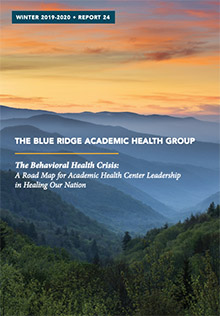
The United States is in the midst of a behavioral health crisis and academic health centers can help lead the way to solutions that improve health and well-being, according to a new report from the Blue Ridge Academic Health Group.
The report identifies a number of barriers that make it difficult, if not impossible, for people to access appropriate and timely care. They include a shortage of trained health care professionals, a lack of capacity for patients and inadequate reimbursement for care. The problems have been compounded by the opioid epidemic, rising suicide rates, and the increasing prevalence of depression, anxiety, and other behavioral health conditions.
Titled The Behavioral Health Crisis: A Road Map for Academic Health Center Leadership in Healing Our Nation, the report provides an overview of the nation’s approach to behavioral health care and makes the case why it must change.
“Academic health centers have a unique opportunity to play a critical leadership role in addressing the behavioral health crisis in our country,” the report finds. “By exploring and advancing new approaches to care, creating new partnerships across our communities and with other AHCs, and investing in training, care models, and research, AHCs can build the essential foundations for innovative, comprehensive, and better health care for our country.”
“Delivering on these opportunities will greatly and beneficially impact overall health and wellness in all of our communities,” it concludes.
The Blue Ridge Group studies and reports on issues important to improving the U.S. health care system and enhancing the ability of academic health centers to sustain optimal progress in health and health care through sound research and professional education.
The group’s co-chairs are Jonathan S. Lewin, MD, executive vice president for health affairs, Emory University; executive director, Woodruff Health Sciences Center; and president, CEO, and chairman of the Board, Emory Healthcare; and Jeffrey R. Balser, MD PhD, president and CEO, Vanderbilt University Medical Center, and dean, Vanderbilt School of Medicine.
The 2019-2020 report on behavioral health is the 24th from the Blue Ridge Academic Health Group. See previous reports on the Blue Ridge Academic Health Group website.
